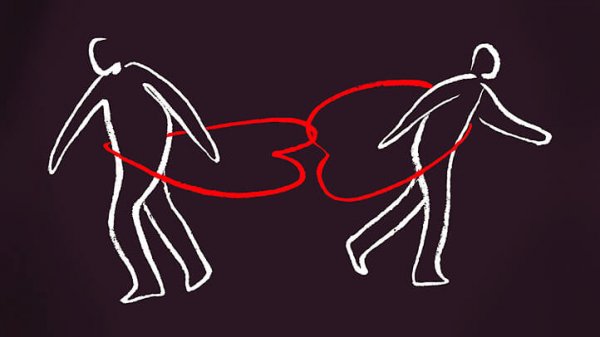Emotional Withdrawal: Pain After a Breakup


Written and verified by the psychologist Valeria Sabater
In fact, the process is very similar to the withdrawal addicts go through. It’s a kind of neurochemical chaos we won’t have an easy time getting out of.
Just about everyone experiences what it’s like. Teenagers find out when they go through their first breakup, the pain of distance, or the disappointment of rejection.
Adults find out too, because our life suddenly feels pointless when it happens, when love expires, when someone cheats. Or even when we just become aware we need to end a relationship with no future, or one that’s just too painful.
Letting go when we still love someone hurts. We have to get used to their absence, accept it’s over, and rebuild our lives without that person.
That’s something most of us aren’t prepared for. But, we do it. And doing it gives us internal strength.
However, the real problem shows up when, instead of turning the page, we fall into an obsessive spiral, a vicious cycle. Needing contact, begging for attention, crying for long periods of time: impossible love.
You may notice that this is a kind of dependence. And for that kind of person, emotional withdrawal puts them in a state of total vulnerability and extreme suffering.

Emotional Withdrawal, or the Impossibility of Saying Goodbye
Carlos is 30 years old, and it’s been 7 months since his girlfriend left him. He met Paula in high school, when they were 16. They went to college together, and down the road they started a small business together.
The past few years were hard, with debt, an unsuccessful business, and Paula’s depression about the stalled project. All of this ended up affecting their relationship.
Even though Carlos insisted on moving forward, she ended up leaving him. She clearly and sincerely explained to him why there would be no second chances for them. That’s where there relationship ended.
But, even with her explanations, Carlos keeps trying to get in touch with her. Every day, he looks at her social media, and thinks of ways to run into her.
Carlos isn’t just obsessed with picking their relationship back up. Even today he’s unable to work or do anything. His emotional withdrawal is so intense it’s turned him into a shadow of himself. He has become dependent on affection, stuck in a cycle of anxiety and depression.
Now let’s look at more characteristics associated with this kind of person.

The 5 Characteristics of Emotional Withdrawal
Something we should be clear about is that in general, when we end a relationship, we’re all capable of experiencing emotional withdrawal. But, this is just one part of the pain.
It’s a chapter that should motivate us to start using smart, useful confrontation strategies. We need to make use of resources to smooth our path and maturely get over the breakup.
- But this psychological condition of stagnation and constant suffering is common for people with a low self-esteem. It’s also common for people with high emotional dependence on their partner.
- Second, another characteristic aspect of emotional withdrawal is that a person won’t be convinced the relationship is over. They’re very clearly in denial.
- Anxious and obsessive behavior is another sign. They’re unable to maintain “zero contact.” They’ll always find an excuse to call or run into them.
- Also, and no less important, dependent people are unable to handle emotional pain. They don’t have the tools to process it. They feel paralyzed and react to the suffering by looking for more chances.
- Lastly, we can’t forget about all the complex, intense, and exhausting symptoms that clearly affect this person’s health. There’s insomnia, loss of appetite, problems concentrating, lack of interest in life, depression…
How do We Deal with Emotional Withdrawal?
Carlos, the heartbroken guy from our example, displays all the psychological and behavioral signs of emotional withdrawal. In his case, what he especially needs is help from a professional, and the right kind of psychological therapy.
No one deserves to live in that kind of defenseless state. No one should stop loving themselves so much that they get stuck in existential meaninglessness and such a destructive state of emotional suffering.
Plus, whether we’re where Carlos is, or whether we’re in the middle of dealing with a breakup, it’ll be good to reflect on these strategies. They’re fundamental things we should always keep in mind.
- Emotional withdrawal, within certain limits of intensity and length, is completely normal. But we have to assume it will pass. It’s a state that should pass and make way for a more balanced, centered, and stable state.
- We have to accept our negative emotions. This is true for all of them: sadness, grief, pain. They’re all states that should pass sooner or later and move on to acceptance and victory.
- Having “zero” contact is fundamental in these cases. We absolutely can’t have our ex-partner on social media or in our contacts. It’s the first step to disconnecting from their lives. This will keep us from falling into the wrong kinds of dynamics.
- Making changes in our lives is rewarding. Something as simple as making new friends or looking for new hobbies will be a big help. This way we can “free our mind,” and break the cycle of our obsession.
As we move through this process, let’s not forget some important aspects. Don’t forget your self-esteem, dignity, values, and goals. We should never see a breakup as the end of the world.
Instead, we should see it as the end of a chapter, and the necessary beginning to something that will definitely mean good things for us. A new, stronger, and even more beautiful version of ourselves.
“Love does not claim possesion, but gives freedom.”-Rabindranath Tagore-
All cited sources were thoroughly reviewed by our team to ensure their quality, reliability, currency, and validity. The bibliography of this article was considered reliable and of academic or scientific accuracy.
- Leary, M. R. (2022). Emotional responses to interpersonal rejection. Dialogues in clinical neuroscience. https://www.ncbi.nlm.nih.gov/pmc/articles/PMC4734881/
- Roth, T. (2007). Insomnia: definition, prevalence, etiology, and consequences. Journal of clinical sleep medicine, 3(5 suppl), S7-S10.
This text is provided for informational purposes only and does not replace consultation with a professional. If in doubt, consult your specialist.








